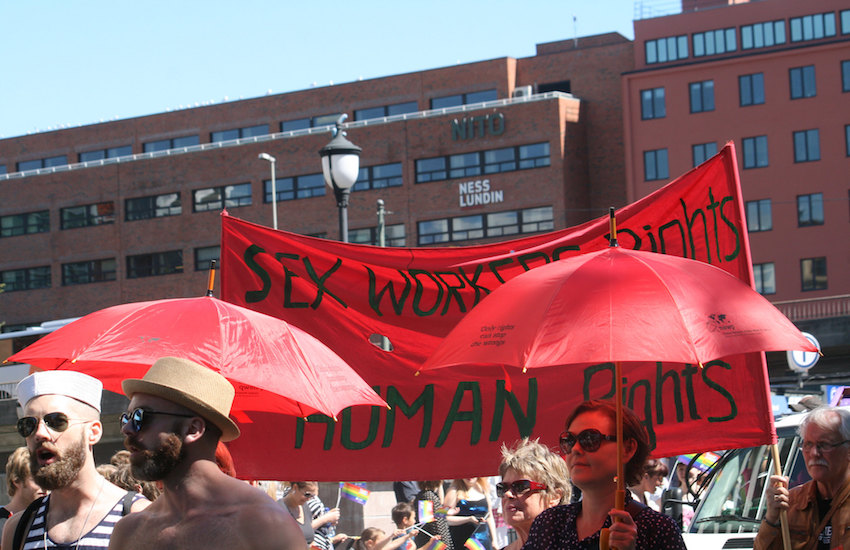‘Sex workers rights are human rights.’
SESTA-FOSTA, two new bills introduced by the United States government earlier this year, are meant to combat sex trafficking. However, they also have negative consequences for those engaging in sex work consensually, including many transgender individuals.
Background
SESTA, or the Stop Enabling Sex Traffickers Act and FOSTA, or Fight Online Sex Trafficking Act, were two bills signed into legislation with bipartisan support. They were approved by the Senate on 21 March and signed into law by President Trump on 11 April. The bills work to amend Section 230 of the Communications Decency Act (CDA), which prevents websites being held accountable for their users’ actions.
These are the same bills that caused Craigslist to close its personals section, and has done the same for other similar sites including Backpage. The website Survivors Against SESTA has been tracking these site closures.
While sex trafficking is awful and should be stopped, these new laws don’t provide any nuance for those who engage in sex work as consenting adults. The bills conflate sex work in its entirety with sex trafficking.
The internet keeps sex workers safe
‘Since their invention, online forums for advertisements and community-building have been essential to sex-worker survival,’ Liz Afton of the Sex Workers Project, which provides social services to people involved in sex work, tells Jacobin Magazine.
‘The bill strips away their access to online platforms that allow them to post advertisements for employment opportunities, build community with other sex workers, and share safety materials such as Bad Date lists — a life-saving resource that alerts other sex workers to predatory individuals so they can avoid dangerous interactions.’
‘SESTA and these closures have already inflicted deep harms. Sex workers have returned to or started working for pimps to find clients since they can no longer do so online. Abusive clients are re-emerging, taking advantage of the blacklists and online communities that have been destroyed,’ a Survivors Against SETSA community organizer using the pseudonym of Lola tells The Daily Beast.
‘The small, niche corners of the internet are being hit the hardest, which also means the most marginalized communities are being hit the hardest.’
Trans sex workers, especially, are harmed
The National Center for Transgender Equality (NCTE) was one major group opposing SESTA-FOSTA.
‘SESTA and FOSTA dangerously expand criminal and civil liability for third-party online hosts that “promote” or “facilitate” the sex trade. While NCTE shares the goal of ending human trafficking in the sex trade, this misguided legislation will put trafficking survivors and others working in the sex trade in greater danger,’ the organization wrote in a statement.
‘Websites that sex workers and those who are being trafficked use to screen clients, share safety information, and negotiate safer working conditions will likely shut down or censor content for risk of liability. Removing these online platforms will not stop traffickers. Instead, it will push sex workers and trafficking survivors alike onto the streets to trade sex, jeopardizing their safety and making it far harder to identify traffickers and hold them accountable.’
What sex workers are saying
‘Because of these bills, even mentioning sex work online puts us at risk of being accused of promoting sex trafficking,’ says Dii, 26-year-old Rroma/Sinti trans sex worker, on a panel about SESTA-FOSTA by Slutever.
‘This opens up a whole host of possibilities for online risk reduction resources—such as rating systems and records for clients—being severely censored or removed altogether. Sex workers have had to adapt to abrupt (and often state-sanctioned) threats to our safety for as long as our livelihood has been criminalized. We have to be very resourceful and flexible to work in this industry. The fact remains that we are running out of safe spaces online. This particularly affects workers who are the most vulnerable to violence, such as trans women of color.’
‘Most of the websites used by my trans brothers and sisters have been shut down or stifled. It scares me to think what kind of world we’ll be in once I’ve transitioned (I’m delaying my medical transition for work reasons), but I’m trying to keep moving and making money to support the folks who can’t work stealth right now,’ says Vee, a 30-year-old transmasculine sex worker.
‘Sex workers help and support each other because many of us don’t have the support of our family and civilian friends, which the ignorance on the topic of this bill has really highlighted. A lot of the websites that I have used to successfully screen out rapists and abusers are now being censored and it’s terrifying.’
‘This bill honestly has me paralyzed with fear (and I wield considerable privilege in this industry for being white passing and assigned female at birth),’ Dii explains.
‘Every day since SESTA has passed I see another advertising platform shutting down or drastically limiting their services – and the law has not even gone into effect. I am not an upscale provider; I don’t have a website with reviews or a steady client base so I rely on various advertising sites. At this point I am counting down the days until I have to go out onto the street – and working on the street makes it much more difficult to establish boundaries and protect yourself.’
How you can help
Below are a list of organizations that support sex workers who are fighting for their rights in the wake of SESTA-FOSTA. Consider donating to or sharing information from these institutions.
Red Light Legal
SWOP Behind Bars
St James Infirmary
El/La Trans Latinas
LYRIC LGBTQ Youth Center
US Prostitutes Collective







